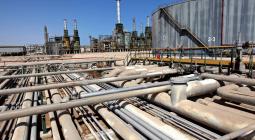Opec under fire for desperate resistance to fossil fuel phase-out at Cop28

The Opec grouping of oil-producing countries is facing a fierce backlash at the Cop28 climate talks in Dubai after it asked member countries to reject any deal that targets an end to fossil fuel burning.
Whether or not the final deal from this year’s climate summit includes a “phase out” of fossil fuels has become the main debate at the negotiations here in Dubai, with around a hundred countries demanding a complete end to coal, oil and gas, the main drivers of the climate crisis, after the hottest year on record.
But in a letter dated Wednesday, reported by The Guardian and Reuters on Friday, Opec secretary general Haitham Al Ghais called on members to reject any language targeting fossil fuels in the final deal. The UAE, which is hosting this year’s climate talks, is one of the key members of Opec.
Several countries’ delegations, including a grouping of small island states and nations that are particularly vulnerable to the impacts of the climate crisis, lashed out at the oil cartel on Saturday.
“I think that it is quite a disgusting thing that Opec countries are pushing against getting the bar where it has to be,” Spanish ecology transition minister Teresa Ribera, whose country holds the rotating EU presidency, told reporters.
French energy minister Agnes Pannier-Runacher said: “Opec’s position endangers the most vulnerable countries and the poorest populations who are the first victims of this situation”.
“I am stunned by these statements from Opec. And I am angry,” she said.
Mr Al Ghais had written in his letter that “the undue and disproportionate pressure against fossil fuels may reach a tipping point with irreversible consequences”. He said that a climate deal that targets fossil fuels and “rather than emissions” can “put our people’s prosperity and future at risk”.
The climate envoy of the low-lying Marshall Islands, which chairs the High Ambition Coalition grouping at the summit, said in response to the letter that nothing is a “greater risk than fossil fuels”.
“Nothing puts the prosperity and future of all people on earth, including all of the citizens of Opec countries, at greater risk than fossil fuels,” Tina Stege said.
“This is why the High Ambition Coalition is pushing for a phase out of fossil fuels, which are at the root of this crisis. 1.5 [degrees Celsius] is not negotiable, and that means an end to fossil fuels.”
Research released on Saturday estimated that new oil and gas projects in key Opec countries could lead to as many as 43 million premature deaths by the end of the century.
These projects will cause estimated climate damages – as measured by the social cost of carbon – of around $19.8 trillion in the Gulf countries and $80 trillion globally, according to the research by . That’s 70 times Saudi-Arabia’s annual GDP.
Climate activists staged a sit-in protest at the Opec pavilion at the summit and called on the Cop28 presidency to distance itself from the Opec statement.
“Opec’s desperate resistance to a fossil fuel phase-out reveals their fear of a changing tide, evident in Cop28 discussions,” said Cansın Leylim from climate advocacy firm 350.org.
When asked about the Opec letter, a Cop28 spokesperson referred The Independent to a statement by Sultan Al Jaber on Friday, in which he said: “I certainly hope that the parties will agree and present a recommendation to the presidency on language, at this COP, on fossil fuels that includes renewable energy and energy efficiency in line with what I said earlier—a just, fair, equitable, and orderly transition.”
So far, 106 countries have supported the call for ditching fossil fuels. A draft text of the final deal released on Friday includes a range of options on what the agreement could say about the future of oil, gas and coal.
The most ambitious option calls for the “phase-out of fossil fuels in line with best available science” while others commit to reducing use of fossil fuels this decade. Another option still on the table is to not have any mention of fossil fuels at all.
Oil producers like Russia and Saudi Arabia have publicly rejected the use of the word phase-out, while countries like Brazil, India and China are deliberating over details of how a proposed phase-out would happen.
But the increasing calls for an end to fossil fuels are backing the oil-producing countries “into the corner and they're on the back foot,” Tom Evans, policy adviser at energy and climate group E3G, told The Independent.
“The balance of the scales is tipping in favour of those calling for a phase-out of fossil fuels,” he said.
Experts say the pressure is now on Cop28 president Jaber, himself the chief executive of the UAE’s state oil company, to convince oil-producing countries to agree to a phase-out and thereby secure a strong outcome from the talks.
Opec under fire for ‘desperate resistance’ to fossil fuel phase-out at Cop28
Spanish minister calls oil cartel’s attempts to influence final Cop28 deal ‘disgusting’
Stuti Mishraat Cop28 in Dubai
Comments0 of 44 secondsVolume 0%
Close
Activist confronts John Kerry over fossil fuel phase out at Cop28
Sign up to the Independent Climate email for the latest advice on saving the planet
The Opec grouping of oil-producing countries is facing a fierce backlash at the Cop28 climate talks in Dubai after it asked member countries to reject any deal that targets an end to fossil fuel burning.
Whether or not the final deal from this year’s climate summit includes a “phase out” of fossil fuels has become the main debate at the negotiations here in Dubai, with around a hundred countries demanding a complete end to coal, oil and gas, the main drivers of the climate crisis, after the hottest year on record.
But in a letter dated Wednesday, reported by The Guardian and Reuters on Friday, Opec secretary general Haitham Al Ghais called on members to reject any language targeting fossil fuels in the final deal. The UAE, which is hosting this year’s climate talks, is one of the key members of Opec.
Several countries’ delegations, including a grouping of small island states and nations that are particularly vulnerable to the impacts of the climate crisis, lashed out at the oil cartel on Saturday.
“I think that it is quite a disgusting thing that Opec countries are pushing against getting the bar where it has to be,” Spanish ecology transition minister Teresa Ribera, whose country holds the rotating EU presidency, told reporters.
French energy minister Agnes Pannier-Runacher said: “Opec’s position endangers the most vulnerable countries and the poorest populations who are the first victims of this situation”.
“I am stunned by these statements from Opec. And I am angry,” she said.
Mr Al Ghais had written in his letter that “the undue and disproportionate pressure against fossil fuels may reach a tipping point with irreversible consequences”. He said that a climate deal that targets fossil fuels and “rather than emissions” can “put our people’s prosperity and future at risk”.
Members of the International Federation of Medical Students Associations hold protest demanding an end to fossil fuels at Cop28 climate summit, in Dubai
(REUTERS)
The climate envoy of the low-lying Marshall Islands, which chairs the High Ambition Coalition grouping at the summit, said in response to the letter that nothing is a “greater risk than fossil fuels”.
“Nothing puts the prosperity and future of all people on earth, including all of the citizens of Opec countries, at greater risk than fossil fuels,” Tina Stege said.
“This is why the High Ambition Coalition is pushing for a phase out of fossil fuels, which are at the root of this crisis. 1.5 [degrees Celsius] is not negotiable, and that means an end to fossil fuels.”
Research released on Saturday estimated that new oil and gas projects in key Opec countries could lead to as many as 43 million premature deaths by the end of the century.
These projects will cause estimated climate damages – as measured by the social cost of carbon – of around $19.8 trillion in the Gulf countries and $80 trillion globally, according to the research by . That’s 70 times Saudi-Arabia’s annual GDP.
Climate activists staged a sit-in protest at the Opec pavilion at the summit and called on the Cop28 presidency to distance itself from the Opec statement.
“Opec’s desperate resistance to a fossil fuel phase-out reveals their fear of a changing tide, evident in Cop28 discussions,” said Cansın Leylim from climate advocacy firm 350.org.
When asked about the Opec letter, a Cop28 spokesperson referred The Independent to a statement by Sultan Al Jaber on Friday, in which he said: “I certainly hope that the parties will agree and present a recommendation to the presidency on language, at this COP, on fossil fuels that includes renewable energy and energy efficiency in line with what I said earlier—a just, fair, equitable, and orderly transition.”
So far, 106 countries have supported the call for ditching fossil fuels. A draft text of the final deal released on Friday includes a range of options on what the agreement could say about the future of oil, gas and coal.
The most ambitious option calls for the “phase-out of fossil fuels in line with best available science” while others commit to reducing use of fossil fuels this decade. Another option still on the table is to not have any mention of fossil fuels at all.
Oil producers like Russia and Saudi Arabia have publicly rejected the use of the word phase-out, while countries like Brazil, India and China are deliberating over details of how a proposed phase-out would happen.
But the increasing calls for an end to fossil fuels are backing the oil-producing countries “into the corner and they're on the back foot,” Tom Evans, policy adviser at energy and climate group E3G, told The Independent.
“The balance of the scales is tipping in favour of those calling for a phase-out of fossil fuels,” he said.
Experts say the pressure is now on Cop28 president Jaber, himself the chief executive of the UAE’s state oil company, to convince oil-producing countries to agree to a phase-out and thereby secure a strong outcome from the talks.
“Cop28 was supposed to be the most inclusive of climate talks, yet fossil fuel lobbyists have found shelter, and are trying to block progress,” Ms Leylim says.
“The spotlight is now on the Cop28’s presidency and if they will broker a deal for a just transition or instead align themselves with the oil industry.”







